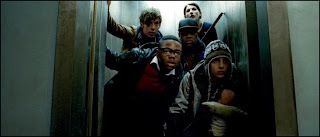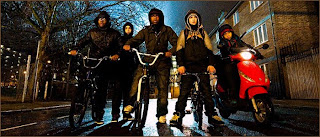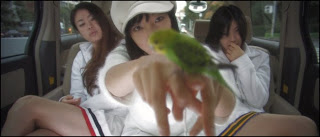Tuesday, January 24, 2012
Sunday, January 22, 2012
Attack the Block: A Review

Attack the Block is one of those rare, fresh-air kind of films you run into every so often. It took a novel concept, and a modest budget, and squeezed the absolute maximum out of it possible. Attack the Block is set in south London, in an area known as the "ends" by our unlikely heroes, a gang of teenage thugs and muggers. We see our protagonists at work being unsavory right off the bat, mugging a terrified woman on her way home from work. It's not until aliens start crash landing all over the "block" and these kids are forced to defend themselves and others from harm do we see the true measure of their character. Many trials and tribulations occur, along with some genuinely clever scenes and plot twists, and we are allowed to see these kids for what they really are, kids. Kids with no purpose or role model, forced to deal with a harsh world on their own terms, suddenly thrust into a situation where they realize what pride, community, and sacrifice are all about.

Attack the Block does what few (recent) science fiction films have been able to do successfully, tie a story about space into a current social issue. In this case, we see the plight of the ghetto and it's inhabitants projected against monsters and interstellar fighting. We are shown that violence begets more violence, and that it is up to all of us to decide who we are and what we want to do with our lives. That living in the projects doesn't make you who you are, that heroes do in fact come from the least likely places. Attack the Block also does a surprisingly good job of building an arc for Moses, the leader of the teenage gang, that resonates with the viewer and gives you a feeling of closure when the film ends. Add that in with the effectiveness of the monsters, with their signature glowing fangs, and the excellent direction, and you have a sci-fi film that can rest comfortably in my top 5 of 2011.

Love Exposure: A Review

Love Exposure is the most Japanese movie ever made.
What that exactly means is a bit more complex and strange, just like the film itself. Love Exposure, at its base, is a romance. But, it's a romance distilled through the diverse and seemingly incompatable influences of Catholicism, upskirt photography, cross-dressing, cults/brainwashing, coreographed fighting, and graphic violence. Spread out over a seemingly immense 237 minutes, Love Exposure follows the trials and tribulations of Yu Honda, a quiet son of a Priest who seeks out a life of sin to please his father's obsession with them. Yu begins to train to snap photos of girl's panties, not because he finds pleasure in them, but because he wants to commit a sin even his hypocritical father finds reprehensable. Eventually these actions cause Yu to become entangled in the plots of a cult-like group called Zero Church, and fall in love with a man-hating girl named Yoko while he is dressed in drag. The myriad of places the movie eventually go are unexpected, yet surprisingly touching and disturbing in equal turns.

Love Exposure explores religion in a way Japanese films only seem capable of at times. The beauty and dangers of faith are displayed equally, and both serve to further the film's narrative. We see the church become a beacon of hope and light, of comfort and care for our protagonist, then suddenly turned into an instrument of hate and guilt because of the failings of men and women. We see people who use that sense of security to manipulate and harm, and we see people who would wear the mantle of faith to give forgiveness to those who may not deserve it, but because it is expected. We see Yu transform over time as he sees sin as something to collect to impress his distant father, who is also a Catholic Priest struggling with his own weaknesses. But, Yu is never anything other than earnestly trying to find love and acceptance, from his family and from the ideal woman he desperately seeks. But, his earnestness and naivety is turned against him by a damaged young girl who operates a cult in order to hold control over as many lives as possible. She claims to be interested in him, but her own horrible and violent past leads her to show her affections more in the vein of breaking him forever versus love and affection.

The film uses a very crude, yet immediately familiar symbol to show "true love" as it were. Yu is shown to never take any kind of pleasure from the photos he snaps, to the point he admits he has never had an erection. He is told he must "become erect from the heart" and continue his search. And, as to be expected, the presence, or lack thereof, of Yu's erections becomes part of the narrative. To his first one, to his inability to control himself around the one he loves, to the cult's attempts to brainwash it out of him, the states of Yu's arousal becomes a mise en scene for the mood of the character. Even reading it in text makes it seems vulgar and rediculous, which it is in part, but there's an unabashed energy to the film that makes it all seem to fit in. Not to mention the contrast we have between Yu, whose erections are presented as almost innocent and pure, and the abusive, dangerous men in the film that shape our female cast. And, of course, the most graphic scene in the film where one man's erection is removed with a incredibly violent, cringe-inducing moment. You'll know it when you see it. And it will add a very unsettling context to the way one of our characters views men.

When viewed as an whole, it becomes very difficult to classify Love Exposure. It's a tragedy, a romance, a drama, a comedy, even a bit of a horror story. It's a film about a small group of people with repressed, abnormal views on sex, love, religion, and society. It's a film about how love shatters preconceptions, but can also reinforce stereotypes. How belonging to something larger than yourself can divide as often as it unites. And, how sometimes a boner can be the most pure sign of love there can be. There's comedy, depression, cross-dressing, weird insular cultures, and even a rampaging swordsman. So, in other words, the most Japanese film ever made.
Love Exposure is a modern classic, and I would consider it a must-watch for all cinema fans. Be prepared for a long journey, but one that is entirely worth taking. 10/10

Subscribe to:
Comments (Atom)



















